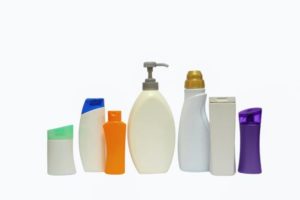 More evidence linking endocrine disrupting chemicals such as butyl paraben, triclocarbon, propyl paraben. with negative health effects (here linked to effects on the pregnancy and baby). It is especially important to try to lower exposure to endocrine disruptors during pregnancy. So read labels on all personal care products and avoid all parabens, phthalates, triclocarban, bisphenol-A (BPA), and triclosan - because what you use on your body will get into your body, From Medical Xpress:
More evidence linking endocrine disrupting chemicals such as butyl paraben, triclocarbon, propyl paraben. with negative health effects (here linked to effects on the pregnancy and baby). It is especially important to try to lower exposure to endocrine disruptors during pregnancy. So read labels on all personal care products and avoid all parabens, phthalates, triclocarban, bisphenol-A (BPA), and triclosan - because what you use on your body will get into your body, From Medical Xpress:
Use of personal care products during pregnancy linked to adverse effects in newborns
A study led by SUNY Downstate Medical Center's School of Public Health presents evidence linking personal care products used during pregnancy to adverse reproductive effects in newborns."The study found a link between women with higher levels of butyl paraben, which is commonly used as a preservative in cosmetics, and the following birth outcomes: shorter gestational age at birth, decreased birth weight, and increased odds of preterm birth," says Laura Geer, PhD, MHS, associate professor in the Department of Environmental and Occupational Health Sciences in the School of Public Health at SUNY Downstate.
The antimicrobial compound, triclocarban, mainly added to soaps, was associated with shorter gestational age at birth. Another common chemical added to lotions and creams, propyl paraben, was associated with decreased body length at birth. The long-term consequences of this are not clear, and, Geer adds, "Findings must be reproduced in larger studies."
Dr. Geer says, "Our latest study adds to the growing body of evidence showing that endocrine-disrupting compounds can lead to developmental and reproductive problems in animals and in humans. Effects observed in previous studies mainly came from animal models only." This study presents evidence of potentially adverse impacts in humans.
Regulations requiring removal of triclosan from various consumer care products have been in place since 2015 in the European Union, but broader regulatory action by the U.S. Food and Drug Administration and the U.S. Environmental Protection Agency has not ensued.
More on this same story from Environmental Health News: Soap, makeup additives linked to preterm births, smaller babies
Pregnant women in Brooklyn with high levels of certain compounds used in makeup and soaps were more likely to have preterm births and babies that weighed less, according to a new study. The study, published online last week in the Journal of Hazardous Materials, provides the first evidence that germ-killing and preservative chemicals used in cosmetics and soaps might impact newborns’ health. It also bolsters suspicions that chemicals in soaps and lotions disrupt people’s endocrine systems, which are crucial for reproduction and babies’ development.
From 2007 to 2009, Geer and colleagues tested 185 mothers’ third trimester urine, as well as the umbilical cord blood of 34 of them, for a suite of different parabens, used mostly in cosmetics, and triclosan and triclocarban, which are used as antimicrobials in soaps. The mothers were from the University Hospital of Brooklyn’s Prenatal Clinic.
The chemicals, especially the parabens, are common: According to the Environmental Working Group’s Skin Deep database, butylparaben is used in 2,245 personal care products, propylparaben is used in 7,212, and triclocarban is used in 21.
The results don’t prove that the chemicals are behind the birth problems. While scientists know the chemicals have some biological activity, the amount of exposure that could cause problems remains unclear. Animals exposed to the chemicals have had some reproductive impacts. In rats, triclocarban impacted male sex organ development in a 2008 study. Paraben exposure decreased male rat sperm counts and efficiency in a 2002 study. One of the most studied endocrine disrupting chemicals, bisphenol-A or BPA, has been linked to multiple birth defects....Except for some color additives, the U.S. Food and Drug Administration does not regulate cosmetic ingredients.
 For years there has been much concern over chemicals that act as endocrine disruptors (hormone disruptors) in the personal products that we use on a daily basis. One big concern is whether these chemicals, such as parabens and phthalates, are causing breast cancer (as well as other harmful health effects). Because whatever you use on your skin, will get into you.
For years there has been much concern over chemicals that act as endocrine disruptors (hormone disruptors) in the personal products that we use on a daily basis. One big concern is whether these chemicals, such as parabens and phthalates, are causing breast cancer (as well as other harmful health effects). Because whatever you use on your skin, will get into you.
 More evidence linking endocrine disrupting chemicals such as butyl paraben, triclocarbon, propyl paraben. with negative health effects (here linked to effects on the pregnancy and baby). It is especially important to try to lower exposure to endocrine disruptors during pregnancy. So read labels on all personal care products and avoid all parabens, phthalates, triclocarban, bisphenol-A (BPA), and triclosan - because what you use on your body will get into your body, From Medical Xpress:
More evidence linking endocrine disrupting chemicals such as butyl paraben, triclocarbon, propyl paraben. with negative health effects (here linked to effects on the pregnancy and baby). It is especially important to try to lower exposure to endocrine disruptors during pregnancy. So read labels on all personal care products and avoid all parabens, phthalates, triclocarban, bisphenol-A (BPA), and triclosan - because what you use on your body will get into your body, From Medical Xpress: